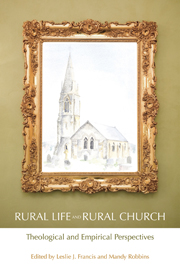Book contents
- Frontmatter
- Contents
- Preface
- Foreword by The Bishop of Shrewsbury, The Rt Revd Mark Rylands
- 1 Introduction: shaping rural theology
- PART 1 PERSPECTIVES FROM THE BIBLE
- 2 Israelite wisdom and pastoral theology in the rural church
- 3 The invisible countryside of the New Testament
- 4 Sheep and goats: pastoral imagery in the Bible and today
- PART 2 PERSPECTIVES FROM ORDINARY THEOLOGY
- PART 3 THEOLOGICAL AND SOCIOLOGICAL PERSPECTIVES
- PART 4 HISTORICAL PERSPECTIVES
- PART 5 LISTENING TO VISITORS
- PART 6 LISTENING TO THE COMMUNITY
- PART 7 LISTENING TO CHURCHGOERS
- PART 8 LISTENING TO CHURCH LEADERS
- PART 9 SATISFACTION AND STRESS IN MINISTRY
- Contributors
- Sources
- Subject Index
- Name Index
2 - Israelite wisdom and pastoral theology in the rural church
from PART 1 - PERSPECTIVES FROM THE BIBLE
- Frontmatter
- Contents
- Preface
- Foreword by The Bishop of Shrewsbury, The Rt Revd Mark Rylands
- 1 Introduction: shaping rural theology
- PART 1 PERSPECTIVES FROM THE BIBLE
- 2 Israelite wisdom and pastoral theology in the rural church
- 3 The invisible countryside of the New Testament
- 4 Sheep and goats: pastoral imagery in the Bible and today
- PART 2 PERSPECTIVES FROM ORDINARY THEOLOGY
- PART 3 THEOLOGICAL AND SOCIOLOGICAL PERSPECTIVES
- PART 4 HISTORICAL PERSPECTIVES
- PART 5 LISTENING TO VISITORS
- PART 6 LISTENING TO THE COMMUNITY
- PART 7 LISTENING TO CHURCHGOERS
- PART 8 LISTENING TO CHURCH LEADERS
- PART 9 SATISFACTION AND STRESS IN MINISTRY
- Contributors
- Sources
- Subject Index
- Name Index
Summary
Abstract – This article argues that pastoral theology proclaimed from rural pulpits and practised in rural ministry may be disloyal to its biblical roots if inadequate attention is given to the distinctive perspective of the Israelite Wisdom tradition. A review of recent significant development in our understanding of this particular biblical tradition is followed by an examination of a prominent aspect of Hebrew Wisdom, namely its anthropocentricity. Attention will be drawn to the literature's key themes including human concerns, human responsibility, human authority, and human limitations.
Introduction
Traditionally the writings ascribed to Israel's sages have included five books: Proverbs, Job and Ecclesiastes in the canon of the Old Testament, and the Wisdom of Solomon and the Wisdom of Ben Sira (Ecclesiasticus) in the Apocrypha. When considering this literature, it is useful to make a distinction between books of a prudential nature, which contain practical advice on how to succeed in life (Proverbs and parts of the Wisdom of Ben Sira), and those of a reflective kind, where the authors probe the meaning of existence and question the accepted order (Job and Ecclesiastes).
Though scholars have recently extended the scope of Israelite Wisdom, having detected the influence of the sages in other parts of the Old Testament such as Genesis, Deuteronomy, and 2 Samuel, this development does not concern us here. The primary focus of this article is on the recognized Wisdom books, and specifically on the Book of Proverbs with its essentially prudential message and optimistic outlook. But before we examine this element in the teaching of the sages, let us note the reception given to the Wisdom tradition in general within Christian scholarly circles during the past half-century.
- Type
- Chapter
- Information
- Rural Life and Rural ChurchTheological and Empirical Perspectives, pp. 8 - 21Publisher: Acumen PublishingPrint publication year: 2012



